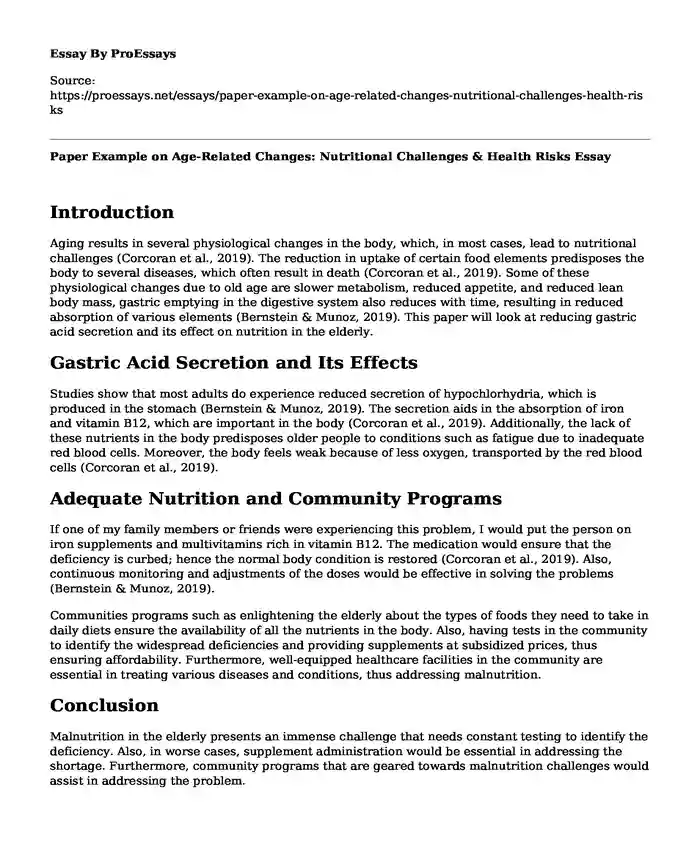Introduction
Aging results in several physiological changes in the body, which, in most cases, lead to nutritional challenges (Corcoran et al., 2019). The reduction in uptake of certain food elements predisposes the body to several diseases, which often result in death (Corcoran et al., 2019). Some of these physiological changes due to old age are slower metabolism, reduced appetite, and reduced lean body mass, gastric emptying in the digestive system also reduces with time, resulting in reduced absorption of various elements (Bernstein & Munoz, 2019). This paper will look at reducing gastric acid secretion and its effect on nutrition in the elderly.
Gastric Acid Secretion and Its Effects
Studies show that most adults do experience reduced secretion of hypochlorhydria, which is produced in the stomach (Bernstein & Munoz, 2019). The secretion aids in the absorption of iron and vitamin B12, which are important in the body (Corcoran et al., 2019). Additionally, the lack of these nutrients in the body predisposes older people to conditions such as fatigue due to inadequate red blood cells. Moreover, the body feels weak because of less oxygen, transported by the red blood cells (Corcoran et al., 2019).
Adequate Nutrition and Community Programs
If one of my family members or friends were experiencing this problem, I would put the person on iron supplements and multivitamins rich in vitamin B12. The medication would ensure that the deficiency is curbed; hence the normal body condition is restored (Corcoran et al., 2019). Also, continuous monitoring and adjustments of the doses would be effective in solving the problems (Bernstein & Munoz, 2019).
Communities programs such as enlightening the elderly about the types of foods they need to take in daily diets ensure the availability of all the nutrients in the body. Also, having tests in the community to identify the widespread deficiencies and providing supplements at subsidized prices, thus ensuring affordability. Furthermore, well-equipped healthcare facilities in the community are essential in treating various diseases and conditions, thus addressing malnutrition.
Conclusion
Malnutrition in the elderly presents an immense challenge that needs constant testing to identify the deficiency. Also, in worse cases, supplement administration would be essential in addressing the shortage. Furthermore, community programs that are geared towards malnutrition challenges would assist in addressing the problem.
References
Bernstein, M., & Munoz, N. (2019). Nutrition for the older adult. Jones & Bartlett Learning. https://books.google.co.ke/books?hl=en&lr=&id=iBGCDwAAQBAJ&oi=fnd&pg=PP1&dq=physiological+changes+of+aging+and+nutrition&ots=
Corcoran, C., Murphy, C., Culligan, E. P., Walton, J., & Sleator, R. D. (2019). Malnutrition in the elderly. Science Progress, 102(2), 171-180. https://journals.sagepub.com/doi/full/10.1177/0036850419854290References
Cite this page
Paper Example on Age-Related Changes: Nutritional Challenges & Health Risks. (2023, Oct 21). Retrieved from https://proessays.net/essays/paper-example-on-age-related-changes-nutritional-challenges-health-risks
If you are the original author of this essay and no longer wish to have it published on the ProEssays website, please click below to request its removal:
- Essay on Purpose of Non-Verbal Communication
- Essay Example on Creativity: Thinking Beyond the Obvious
- Paper Example on Teacher Self-Awareness: Examining Strengths, Weaknesses & More
- Diabetic Patients at Risk: Hypertension & Atherosclerosis - Essay Sample
- Essay Example on Motivation & Emotion: Interrelated for Optimal Performance
- Mass Incarceration: Disproportionate Impact on Minorities - Research Paper
- Free Essay Sample on Transgender Athletes in Sports: Pros and Cons







